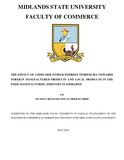Please use this identifier to cite or link to this item:
https://cris.library.msu.ac.zw//handle/11408/3836| Title: | The effect of consumer ethnocentrism tendencies towards foreign manufactured products and local products in the food manufacturing industry in Zimbabwe | Authors: | Siziba, Bekezela | Keywords: | Consumer ethnocentrism Food manufacturing Zimbabwe |
Issue Date: | 2018 | Publisher: | Midlands State University | Abstract: | This study sought to investigate the effect of consumer ethnocentrism tendencies towards imports and local products in the food manufacturing industry in Zimbabwe. The research was guided by the following objectives namely: to determine the impact of demographic characteristics on cognition and affect, to examine the influence of product attributes on cognition and affect, to measure Zimbabwean ethnocentric tendencies and to investigate how the local food manufacturing industry can use product attributes to prompt consumers to purchase locally manufactured products. Literature on consumer ethnocentrism and consumer attitudes was reviewed in this study. Information on consumer ethnocentrism was reviewed to understand how marketers can use the concept to promote local food products. The research was based on a positivist approach. The research was also based on a survey design of the food manufacturing industry customers and marketing personnel of OK Zimbabwe, PicknPay and Spar. The sample size was 400.The research also used a quantitative research philosophy and the data gathered was analysed through descriptive and inferential statistics using SPSS software. The data was presented in the form of data tables, cross tabulation and bar graphs. The major findings were that Zimbabwean purchased imports because of the negative beliefs and emotions they have towards locally manufactured products. Also, results show demographic characteristic as having a varying relationship on cognition and affect. Zimbabweans believed imports are of better quality and are reasonable priced compared to imports. Moreover, results also showed that Zimbabwean have less ethnocentric tendencies as they were found to be less patriotic, not socio economic conservatism. Consumers did not like bans and restrictions on imports and they were not worried about the long term impact of purchasing foreign products. The findings of this study were also similar previous studies in that consumers from developing countries are less ethnocentric therefore they prefer imports instead of local products and they view imports as of higher quality.. This study established Zimbabwean consumers as being less ethnocentric and did not overstate the quality and value of food products made in Zimbabwe. Conclusions drawn are that Zimbabwean consumers are less ethnocentric, they would prefer buying imports and locals should improve product quality attributes. The study recommends marketers of local food manufactures improve products attributes thereby creating a positive attitude towards locally produced food products. Also, local food manufactures should consider demographic differences when producing food products and the important factors considered by consumers when purchasing food products. | URI: | http://hdl.handle.net/11408/3836 |
| Appears in Collections: | Master Of Commerce In Marketing Strategy Degree |
Files in This Item:
| File | Description | Size | Format | |
|---|---|---|---|---|
| Bekezela Siziba-Final dissertation. (21 Jan 2019).pdf | Full Text | 1.38 MB | Adobe PDF |  View/Open |
Page view(s)
294
checked on Feb 10, 2026
Download(s)
192
checked on Feb 10, 2026
Google ScholarTM
Check
Items in MSUIR are protected by copyright, with all rights reserved, unless otherwise indicated.



